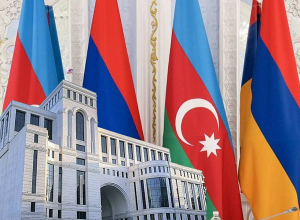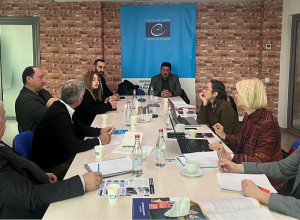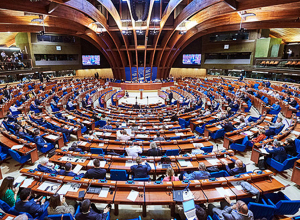Opening speech of the President's urgent press conference (video)
Support A1+!Opening speech of the President's urgent press conference
I will divide my introductory remarks into three main parts: the blockade of Nagorno-Karabakh (Artsakh), the conflict between Azerbaijan and Nagorno-Karabakh, and expectations from the international community.
225-day of illegal blockade and 40-days of total siege
The background and context of the unlawful siege of Artsakh have already been presented. It is evident that Azerbaijan, under the conditions of international impunity, continuously tightens repressions against the people of Artsakh with the undisguised purpose of ethnic cleansing, driven by a policy of ethnic hatred and discrimination.
During this time, the International Court of Justice and the European Court of Human Rights have issued legally and politically binding rulings to ensure an unimpeded movement of people, vehicles, and cargo through the Lachin Corridor in both directions. Furthermore, the European Parliament, the Parliamentary Assembly of the Council of Europe, various states' legislative and executive authorities, and authoritative international human rights organizations have all made clear demands and appeals to the authorities of Azerbaijan to cease the illegal siege of Artsakh and refrain from using force or threats of its use. However, Azerbaijan has not only disregarded court rulings and the demands of the international community but has also expanded and deepened the blockade and military threats.
1. The objectives of the siege
Through the unlawful siege of Artsakh, Azerbaijan pursues several goals, including:
o Long term: To destroy in whole the entire ethnic Armenian population of Artsakh and forcefully end the conflict by eliminating the people of Artsakh from their land.
o Medium term: To subjugate the people of Artsakh by force, dismantle the Republic of Artsakh and its resistance systems, force the people of Artsakh to flee, collapse the economy of Artsakh, and gain additional leverage over Armenia, particularly by obtaining an extraterritorial road between Azerbaijan and Nakhichevan through Armenian territory.
o Short-term: To subject the people of Artsakh to psychological terror, establish constant control over the entry and exit of Artsakh, create unbearable living conditions, test and cross the red lines of the Armenian parties, and discredit international and regional guarantees of security and stability.
2. Forms of the illegal siege
● Blocking the movement of people, vehicles, and cargo.
● Disrupting infrastructure, including electricity, gas, water supply, and communication.
● Security threats: Frequent attacks and provocations, intense militarization of areas, shootings at individuals carrying out agricultural work.
● Psychological terror: Using aggressive rhetoric, employing force and threats, and creating an atmosphere of uncertainty and fear.
● Information blockade: Spreading disinformation and fake news, blocking access for international fact-finding missions, journalists, and humanitarian organizations.
3. The consequences of the unlawful siege
As a result of the blockade, we are currently witnessing a humanitarian disaster that affects all aspects of life, from food and healthcare to agriculture and education. Human lives are at risk, from newborn babies to elderly chronic patients, due to the direct and indirect impacts of the blockade.
● A severe food shortage has emerged since approximately 90% of the food consumed in Artsakh was previously imported from Armenia. Over the past 40 days, not a single kilogram of food has entered Artsakh, and the limited local production has been greatly hindered by the lack of fuel and other essential materials.
● The scarcity of fuel and necessary supplies has resulted in only 20% of agricultural work being completed, and even grain harvesting has been done in a very limited capacity. Economic enterprises, which were partially operational during the blockade, have also come to a halt. Public transport has almost entirely ceased, and essential services, including healthcare, are struggling to function.
● The healthcare system is facing a critical shortage of various medicines, putting people's lives and health at risk. The number of deaths and complications among unborn and newborn babies has doubled, and anemia among pregnant women has reached a staggering 90%. All planned medical examinations and surgeries have been suspended, and hundreds of patients cannot travel to Armenia or abroad for treatment. Essential medical equipment is out of order due to power outages and a lack of necessary maintenance.
● Schools and kindergartens have been partially or completely closed at various times due to heating and food problems. The psychological terror and malnutrition have significantly affected children's receptivity and academic progress, and hundreds of students are unable to pursue their education in Armenia or abroad.
● It has been 196 days since Azerbaijan interrupted the electricity supply from Armenia to Artsakh, resulting in frequent power outages for at least six hours daily, leading many economic enterprises to halt operations. Additionally, gas supply has been entirely cut off for 158 days, causing numerous socio-economic consequences.
● In the private sector, all factories and almost all service companies have closed down, leaving over 80% of private sector workers unemployed, amounting to more than 15,000 people. The construction of 3,700 apartments intended for families displaced by the war in 2020 has also come to a stop. The direct loss to the economy amounts to about $430 million, which represents approximately 50% of the projected annual GDP.
4. Assessment of the blockade
Azerbaijan deliberately inflicts on the people of Artsakh conditions of life calculated to bring about its physical destruction in whole or in part imposes living conditions on the people of Artsakh that aim at the complete or partial destruction of the population. According to international law, such an intent amounts to a genocide, and it obliges all states of the international community to take steps to prevent this crime of genocide.
Azerbaijan's claims that the issue of Artsakh is its internal matter are reminiscent of the justifications made by the leadership of Nazi Germany during the Nuremberg trials who attempted to narrate mass murders as internal affairs. The civilized international community did not accept such a defense then and denied the alleged right to carry out massive human rights violations under the pretext of internal affairs now.
The delay in decisive action by the international community brings us closer to the point of irreversibility with each passing day.
Azerbaijan-Karabakh conflict
The conflict cannot be considered resolved until the underlying political issues are addressed, particularly those pertaining to the security and rights of the people of Artsakh, including the recognition and protection of their right to self-determination.
At the same time, I strongly emphasize that the Azerbaijan-Karabakh conflict should be settled through negotiations. The Republic of Artsakh has always been open to engaging in negotiations with Azerbaijan to achieve a balanced, fair, and dignified resolution to the conflict. We believe that negotiations should take place within an agreed international format that has an appropriate mandate, ensuring active participation and legitimacy from the international community in the negotiation process.
The success of negotiations relies on the genuine willingness of both parties to resolve their differences in good faith, avoiding any attempts to impose the will of one party on the other.
Throughout the negotiation process, the international community should guarantee that force or the threat of force will not be used. Effective mechanisms of international guarantees are essential to ensure that both parties fulfill the obligations they undertake during negotiations.
It is of utmost importance that the parties involved refrain from using unilateral coercive measures, including political, military, and any other forms of oppression. The purpose of negotiations should not be to legitimize or impose ultimatums but rather to foster an atmosphere of cooperation and mutual understanding.
Trading in people's sufferings is unacceptable. The transportation and energy blockade of Artsakh, designed to maximize the distress of its people, must be immediately and unconditionally halted in accordance with the decisions of the International Courts and the principles of justice.
Ending the illegal siege and alleviating the suffering of the people will create the necessary minimum prerequisites for initiating negotiations and foster more favorable conditions for meaningful discussions.
The negotiation process must be grounded in international law norms and universal values, such as justice, dignity, and equality. Any artificial boundaries that could predetermine the outcome of negotiations should be excluded.
It is crucial to emphasize that one of the central issues of the peace process remains the status of Artsakh, which remains unresolved from the point of international law. The right to self-determination of our people and the imperative need to prevent genocide form an indisputable basis for recognizing and securing the right to external self-determination, grounded in the concept of "remedial secession." This principle was of vital importance in 1991 when the region councils of the Nagorno-Karabakh Autonomous Region and the Shahumyan region proclaimed the Nagorno-Karabakh Republic based on international law and USSR legislation.
Expectations from the international community
Given the current dire situation and the increasing threats to the physical existence of our people, I am declaring Artsakh a disaster zone today, urgently seeking a comprehensive international response and in need of security, political, and humanitarian support from the international community, collectively and individually. Artsakh is now the only area in the world facing complete isolation and siege, with no access to humanitarian relief and international presence. If the declaration of a disaster zone does not lead to an immediate international support, Artsakh could be likened to a concentration camp, with all the dire consequences it entails.
I have personally written letters to the presidents of the OSCE Minsk Group co-chair countries, who are also permanent members of the UN Security Council, and to the UN agencies, providing a detailed account of the humanitarian situation in Artsakh and demanding prompt and appropriate action to address the crisis.
The time has come to consider unilateral action as a last resort to prevent mass crimes. Our foremost demands are directed towards the parties involved in the Trilateral statement of November 9, 2020, particularly towards Russia as the security guarantor, and Armenia, urging them to fulfill their obligations. We call on Armenia to refrain from making any statements or
taking actions to recognize Artsakh as part of Azerbaijan and respect the right of the people of Artsakh to self-determination.
We demand the UN Security Council, within the scope of its mandate and obligations, to take decisive steps to prevent the genocidal policy implemented by Azerbaijan and ensure the implementation of the decisions of the International Court of Justice and the European Court of Human Rights, particularly regarding the opening of the Lachin Corridor.
In this regard, I urgently request the involvement of the United Nations, its entire system, and specialized agencies mandated specifically to act in situations of humanitarian crises . The international community's support is crucial to safeguard the lives and rights of the people of Artsakh during these critical times.
I urgently call upon the Secretary-General of the United Nations, Mr. Guterres, to demonstrate a moral and political responsibility and leadership in alerting the international community to the plight of the people of Artsakh. . I urge Mr. Guterres without delay and without hesitation to put in action the United Nations system to address this crisis.
I am ready to personally present the dire humanitarian situation in Artsakh to Mr. Guterres in an online format, emphasizing the urgency of the matter.
I urge the Under-Secretary Generals for Humanitarian Affairs and for Political and Peacebuilding Affairs to act now in raising awareness of the crisis in Artsakh and insisting on immediate efforts of the international community to mandate the UN action in Artsakh. They must raise their voices about the crisis in Artsakh and demand urgent efforts from the international community to authorize the entry and presence of the United Nations in Artsakh.
Additionally, I urge the executive directors of UNICEF, the United Nations World Food Program, and the United Nations Population Fund, along with the Director-General of the World Health Organization, to live up to their mandates and responsibilities, and deliver relief and presence on the ground.
I appeal to all actors involved to cease supporting Azerbaijan's criminal agenda, as it only exacerbates the suffering of innocent people. I call for concrete steps to be taken to ensure a favorable environment for the stable security of the people of Artsakh and a peaceful and just settlement of the conflict. The international community must unite and take decisive action to alleviate the immense hardships faced by the people of Artsakh and work towards a lasting resolution for the benefit of all involved parties.
Today, the prevention of genocides and other mass atrocities is not just an option but an erga omnes obligation that the international community must comply with. It is unacceptable to limit
this obligation merely to the willingness to engage the parties in negotiations. The responsibility to prevent genocide extends far beyond the negotiating table.
The international community, in the face of the UN Security Council, including three OSCE Minsk Group co-chair countries as members, and mandated with primary responsibility for international peace and security and prevention of atrocity crimes, possesses all the necessary tools to stop Azerbaijan's genocidal policy.
The international impunity of Azerbaijan must be put to an end, as failure to hold those responsible accountable will only pave the way for the occurrence of new and even more severe crimes which are about to be committed.



